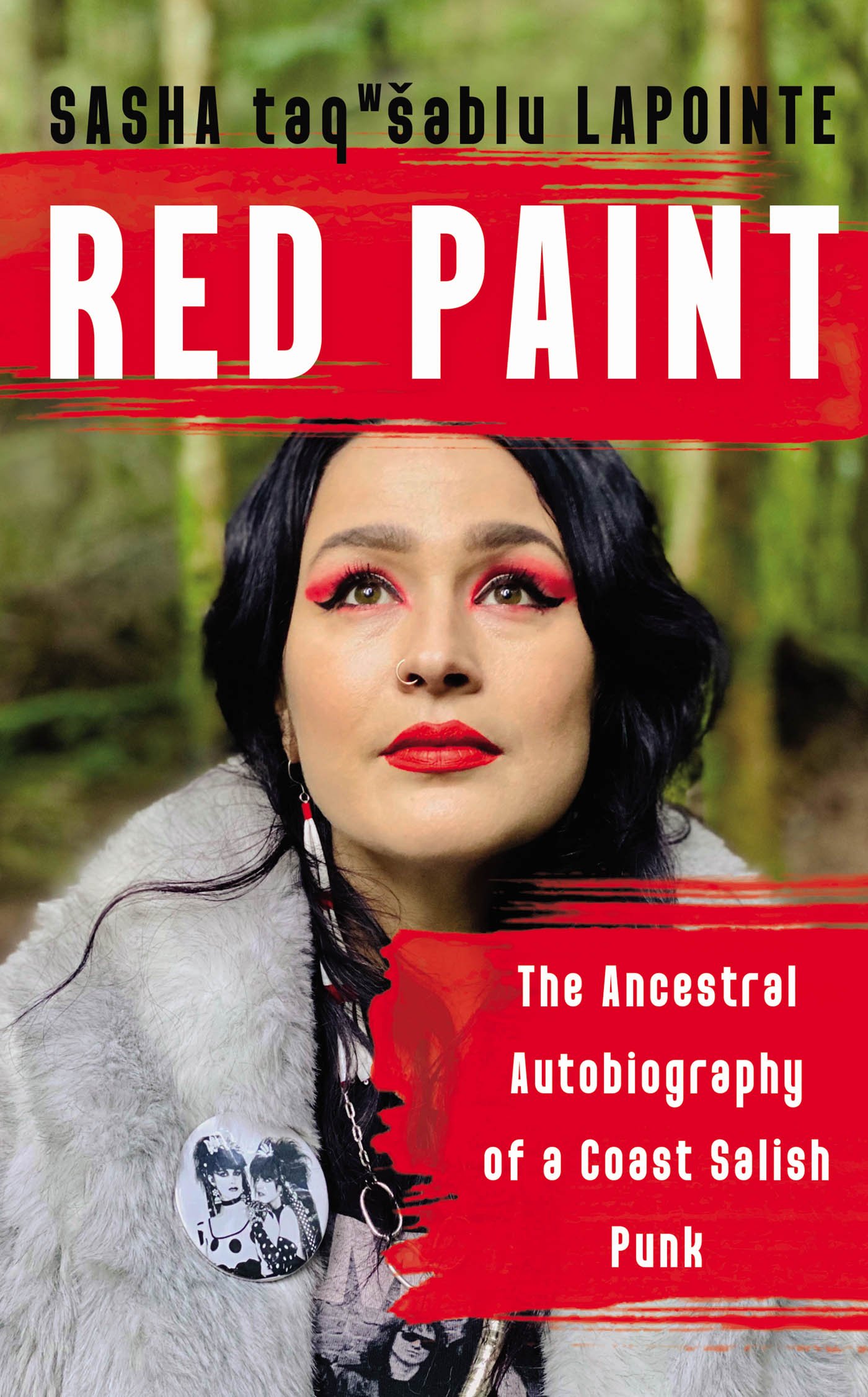Kathleen Alcalá reviews Sasha taqʷšəblu LaPointe's RED PAINT
RED PAINT: The Ancestral Autobiography of a Coast Salish Punk
A review by Kathleen Alcalá
I picked up this book because I was slightly familiar with the author from her work on the nearby Suquamish Reservation. I live on Suquamish land, and was happy to see a next generation stepping up to be leaders. Those of us in the area were somewhat skeptical of what the results would be when Suquamish built a casino. Things were quiet for ten, fifteen years, then the tribe began to fund programs that benefit all of us in the wider community, from jobs for all tribal members to the Suquamish Museum.
Sasha taqʷšəblu LaPointe is not Suquamish, but she is a descendant of two local tribes, the Nooksack and Upper Skagit tribes. To my delight, I discovered in the book that Sasha is the great-granddaughter of Vi taqʷšəblu Hilbert, a renowned storyteller who in large part helped recover the Lushootseed language of the coastal tribes before her passing in 2008. I interviewed Hilbert for an early issue of The Raven Chronicles, around 1991, and am continually struck by the importance of the role she played in language and cultural recovery. This is especially clear to me as I work with others of my tribe, the Ópata Nation, to recover and re-birth a language that has been all but obliterated by other languages and interests.
As a reader, we are confronted over and over again with what people, especially women, must do to survive, both historically and in contemporary times.
LaPointe’s journey has not been easy, and her early interest in the punk scene makes complete sense. Raped by a family acquaintance at the age of ten, she began to run away, hitchhike, and spend homeless time in search of a safe place to stay by the age of thirteen. Her story up to this point is not uncommon. But she never forgot the legacy of her great-grandmother and namesake, and managed to get through school, and even graduate school at the Institute of American Indian Arts (IAIA).
LaPointe was attracted to her husband, a punk rocker, because he resembled Agent Cooper (played by Kyle MacLachlan) in Twin Peaks. LaPointe had loved the series for its setting in the dark green Pacific Northwest, its quirky sensibility, and for David Lynch’s fealty to the mystery of life. “I loved the show immediately. It was special to see Washington represented on-screen, to recognize the dense forests and dark bodies of water where I grew up flickering back at me as I watched the show late into the night.” (pg. 18)
Soon, she was traveling with the band, and felt that she needed to prove her worth as a roadie and hawker of merch. The conflict between the band’s interests and her own soon became apparent, as well as the larger issue of the male ego and the place of women on the punk scene.
As LaPointe recounts her journey, we see her descend into the “sickness” her partner sees in Sasha, her mother, and all her female ancestors. Plagued by bad dreams, PTSD, and other ailments, she separates from him to fight her demons alone. In counterbalance, LaPointe stays in contact with a male friend who embodies the gentler side of human nature.
As the book progresses, LaPointe turns to researching the legacy of her ancestors, including Comptia Koholowish, a Chinook woman from the coast who, after much tragedy, married a Scottish sea captain. This enabled him to claim twice as much land as a single white settler. As a reader, we are confronted over and over again with what people, especially women, must do to survive, both historically and in contemporary times. Today we worry about acknowledging the women who contribute to scholarly papers, but we can’t forget that people gave their lives over to birthing and raising settler children, even when, like Comptia, they were not allowed in the house.
I am struck most of all by how LaPointe’s life is so closely wrapped in the landscape of the Northwest. Early on, LaPointe is told by her mother that she cannot wear red paint on her face until she earns it, that it is more than decoration. In desperation, she follows the example of medicine person Aunt Susie Sampson and submerges herself in the freezing Nooksack River, seeking to rid herself of this ancestral sickness that threatens to destroy her. Thankfully, Vi Hilbert left her more than just a name.
I look forward to more literature exploring the links of the land to its people in the Northwest.
KATHLEEN ALCALÁ was born in Compton, California, to Mexican parents, and grew up in San Bernardino. She has a BA in linguistics from Stanford University, an MA in Creative Writing from the University of Washington, and an MFA from the University of New Orleans. Both a graduate of and instructor in the Clarion West Science Fiction and Fantasy program, her work embraces both traditional and innovative storytelling techniques. She is the author of six award-winning books that include a collection of stories, three novels, a book of essays, and, most recently, The Deepest Roots: Finding Food and Community on a Pacific Northwest Island. In addition, she is the author of numerous essays and short stories
RED PAINT, The Ancestral Autobiography of a Coast Salish Punk
by Sasha taqʷšəblu LaPointe
ISBN: 978-1-6400941-4-7
Counterpoint: Berkeley, CA
https://www.counterpointpress.com
2022, hardcover, 240 pages, $25.00
